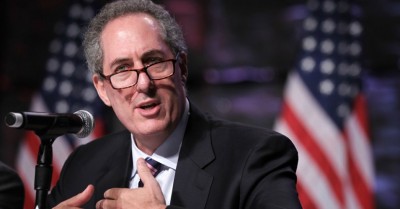Lawmakers Say TPP Meetings Classified To Keep Americans in the Dark

US Trade Representative Michael Froman is drawing fire from Congressional Democrats for the Obama adminstration’s continued imposition of secrecy surrounding the Trans-Pacific Parternship. (Photo: AP file)
Democratic lawmaker says tightly-controlled briefings on Trans-Pacific Partnership deal are aimed at keeping US constituents ignorant about what’s at stake
Lawmakers in Congress who remain wary of the Trans-Pacific Partnership (TPP) trade agreement are raising further objections this week to the degree of secrecy surrounding briefings on the deal, with some arguing that the main reason at least one meeting has been registered “classified” is to help keep the American public ignorant about giveaways to corporate interests and its long-term implications.
With a briefing set between members of Congress and U.S. Trade Representative Michael Froman and the Labor Department for Wednesday, the lack of transparency and the inability to discuss openly what they learn in the meetings has especially drawn the ire of progressive Democrats who say the TPP is being jammed through without a full airing of its negative consequences.
As The Hill reports:
Members will be allowed to attend the briefing on the proposed trade pact with 12 Latin American and Asian countries with one staff member who possesses an “active Secret-level or high clearance” compliant with House security rules. Rep. Rosa DeLauro (D-Conn.) told The Hill that the administration is being “needlessly secretive.”
“Even now, when they are finally beginning to share details of the proposed deal with members of Congress, they are denying us the ability to consult with our staff or discuss details of the agreement with experts,” DeLauro told The Hill.
Rep. Lloyd Doggett (D-Texas) condemned the classified briefing.
“Making it classified further ensures that, even if we accidentally learn something, we cannot share it. What is [Froman]working so hard to hide? What is the specific legal basis for all this senseless secrecy?” Doggett said to The Hill.
“Open trade should begin with open access,” Doggett said. “Members expected to vote on trade deals should be able to read the unredacted negotiating text.”
“I’m not happy about it,” Rep. Alan Grayson (D-Fla.) told the Huffington Post, referring to the briefing with Froman and Labor Secretary Thomas Perez on Wednesday. The meeting—focused on the section of the TPP that deals with the controversial ‘Investor-State Dispute Settlement’ (ISDS) mechanism—has been labeled “classified,” so that lawmakers and any of their staff who attend will be barred, under threat of punishment, of revealing what they learn with constituents or outside experts.
According to the Huffington Post:
ISDS has been part of U.S. free trade agreements since NAFTA was signed into law in 1993, and has become a particularly popular tool for multinational firms over the past few years.
But while the topic remains controversial, particularly with Democrats, many critics of the administration emphasize that applying national security-style restrictions on such information is an abuse of the classified information system. An additional meeting earlier on Wednesday on currency manipulation with Froman and Treasury Secretary Jack Lew is not classified.
“It’s not like they will be discussing the nuclear codes,” said Lori Wallach, director of Global Trade Watch at Public Citizen.
The Obama administration has not publicly released drafts of the Trans-Pacific Partnership deal that it continues to negotiate with 11 other nations. […] The public has had to rely on leaks of individual deal chapters to adjudicate claims.
Among its other critics, Sen. Elizabeth Warren has slammed the idea of ISDS provisions as a surrender of democratic ideals to corporate interests. According to Warren, ISDS would simply “tilt the playing field in the United States further in favor of big multinational corporations.” By having unchallenged input on secretive TPP talks, Warren argued last month, these large companies and financial interests “are increasingly realizing this is an opportunity to gut U.S. regulations they don’t like.”
According to Grayson, putting Wednesday’s ISDS briefing in a classified setting “is part of a multi-year campaign of deception and destruction. Why do we classify information? It’s to keep sensitive information out of the hands of foreign governments. In this case, foreign governments already have this information. They’re the people the administration is negotiating with. The only purpose of classifying this information is to keep it from the American people.”
And DeLauro added, “If the TPP would be as good for American jobs as they claim, there should be nothing to hide.”

